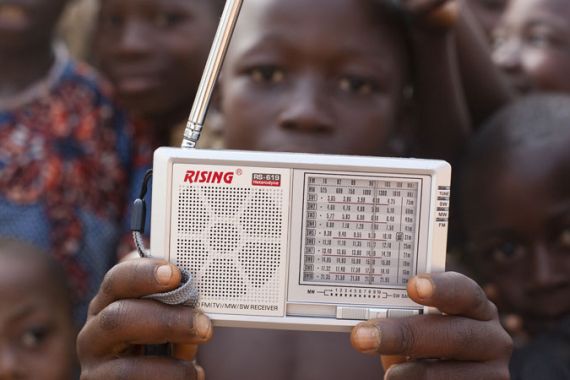
Let Us Talk
Can a fragile network of small radio stations help bring reconciliation to Sierra Leone?
Editor’s note: This film is no longer available online.
Can a single voice over the radio move listeners beyond the pain and anger of recent memories – violence that pit neighbours against each other, the exploitation of child soldiers, unimaginable atrocities, and the displacement of millions?
Keep reading
list of 4 itemsLawmakers brawl as Georgian Parliament considers ‘foreign agent’ bill
Journalist loses foot after being badly wounded in Israeli attack in Gaza
Press freedom group says representative denied entry to Hong Kong
For the people of Sierra Leone, a nation struggling to repair itself after more than a decade of war, the answer to that question comes in the simple Krio phrase “Leh Wi Tok”, meaning Let us talk.
We follow the story of a radio pioneer and his unrelenting quest to grow a network of community-based radio stations in his country so that peace and democracy can flourish.
FILMMAKER’S VIEW
By John Lavall
Let Us Talk is a documentary about radio journalist Andrew Kromah and his efforts to grow an independent network of community-based radio stations in his home country, Sierra Leone. Amidst flagrant and persistent political harassment, financial and technical woes, Andrew literally puts his life on the line to bring information to his listeners and offer a platform to disparate and often unheard voices.
|
|
For many, radio is main the source of information in Sierra Leone. “They can’t read or write, they can’t watch TV, they can’t read the newspapers, they don’t use the internet, most of them don’t have telephones – they rely on their radio stations, so much that whereever they go they have their radio stations.” Andrew says.
But can radio succeed in moving listeners beyond the pain and anger of recent memories? Can it help them forget the violence that pits neighbours against each other, the exploitation of child soldiers, and the displacement of millions?
I spent five weeks in Sierra Leone making this film. I have travelled to Ghana, Ethiopia and recently Kenya to make films. My trip to Ethiopia was emotionally strenuous because it was my first experience in a refugee camp, and travelling to post-war Sierra Leone was sometimes more difficult than I expected it to be.
I think it was the lack of infrastructure and the travel to the rural Kailahun District that was the most gruelling. The dirt road from Kenema to Kailahun is 85 miles long but takes seven to eight hours to travel with four-wheel drive trucks and is sometimes impassable due to the rains.
Although everyone I met along the way was gracious and kind, their stories of the atrocities of the country’s 11-year-long civil war were heartbreaking and sometimes difficult to comprehend. What amazed me most was the ability of the people of Sierra Leone to forgive each other and reconcile after such a long and brutal conflict, and their strength and determination to rebuild their amazing and beautiful country.
My visual approach to this film was a purposeful combination of direct cinema, sit-down interviews, and a very limited use of archival footage. From the outset, I wanted the focus of this story to be about rebuilding without dwelling on the horrors of the past.
As I moved forward with the story, I realised that recounting past atrocities was integral to telling the story of the country’s future. I researched other films about Sierra Leone and found that the majority of films have used very graphic images of the conflict but I wanted to instead focus on visual metaphors to describe the horrible acts that transpired during the civil war. I wanted the film to rely on the observations of those who lived through the war rather than a voiceover narration.
The film was shot by cinematographer, Tim Metzger, whose documentary Sun Come Up was nominated for a 2011 Academy Award. Other crew members include Kate Kelley, who worked on the film as a still photographer and worked alongside Tim Metzger providing additional photography. I produced and directed the film and also did all the post production and sound design. Mary Copp was a producer on the film. The film’s major underwriter was The Foundation for West Africa, a Rhode Island-based non-profit organisation.